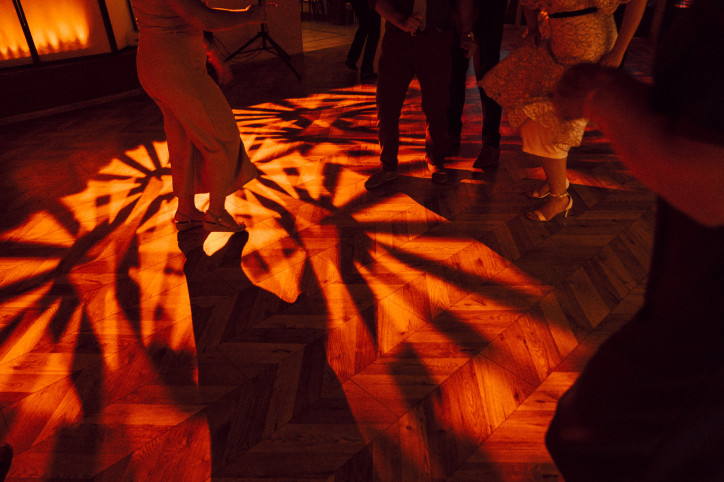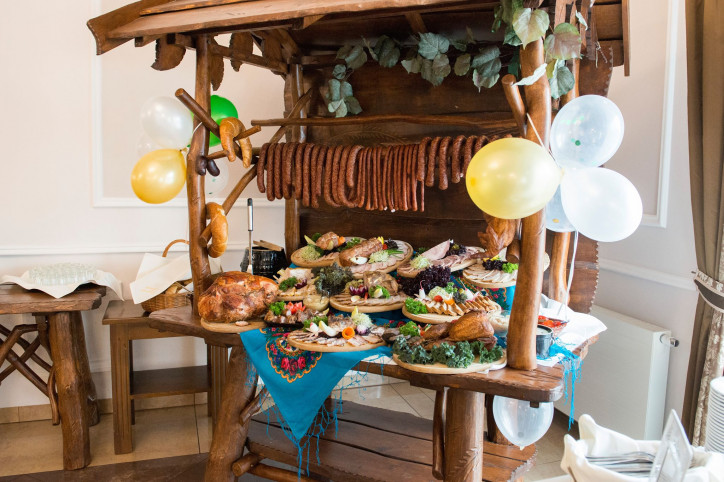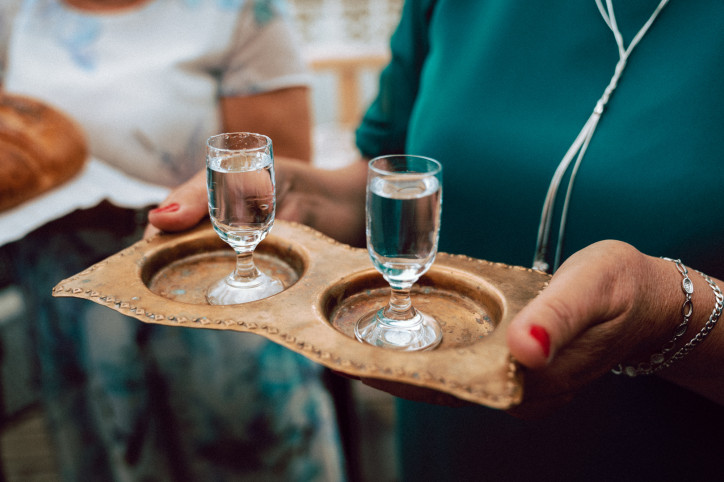
As the sweet scents and gentle colours of blossoming spring-time trees give way to the warmer summer months, love is in the air across the northern hemisphere. In Europe, June tends to mark the start of wedding season, and it’s no different in Poland. The Polish diaspora reaches far and wide – those from across the globe may be friendly with a Pole or two – meaning that invitations to Polish weddings can find themselves crossing borders and bringing wedding guests to the country for the first time…
…well, in normal times, that is. In the year 2020, there’s no escaping the fact that the global pandemic has shut down borders and flights, spelling a swift end to any overseas wedding plans. Of course, this hasn’t only impacted the preparations of foreign guests. Domestic restrictions have targetted, among others, group gatherings, effectively ruling out any matrimonial services and festivities. With good reason. In the current health climate, nothing could be worse than bringing together hundreds of people of all age groups – some of them from different parts of the country – to stand and sit next to each other for hours. And yes, dear reader, this has affected me, too. The Polish government’s recent loosening of restrictions allows for weddings of up to 150 people; understandably, my friends in Gdańsk decided not to take the health risk for their planned wedding in mid-June. A different invitation beckons in July, but I wouldn’t be at all surprised if this wedding was also cancelled.
All of this makes me a little sad. Not because I’m missing out on a knees-up – not going to a wedding is a tiny and entirely trivial sacrifice to make when public health is at stake – but because Polish weddings are such joyous occasions and a wonderful way to become acquainted with the warmest Polish traditions. To be clear, I am primarily talking about wedding receptions here. While I’ve been to some beautiful churches for the wedding ceremony (or ślub), this part of the wedding is largely concerned with Catholic tradition, which – as an agnostic Brit – is far more difficult for me to follow in a meaningful way compared with the customs that present themselves later on in the day. The wedding reception, on the other hand, is a cultural (and culinary) feast that shines a light on the hospitality at the heart of Polish society.
Some of this becomes clearer if we look at the Polish word for ‘wedding reception’. This word – wesele – shares its roots with other Polish words, such as the noun wesołość and the adjective wesoły. Both of these words can be translated in a few ways: the former refers to ‘cheerfulness’ and ‘merriment’, while the latter describes someone or something as ‘merry’, ‘happy’, ‘joyous’. Naturally, all of these words feel appropriate for any reception, regardless of the country in which it is held. Yet the fact that such words are in the linguistic structure of the noun wesele itself is quite telling. If in English-speaking countries (and, indeed, many other European countries) you can expect to be ‘received’ at a ‘reception’, in Poland, you’re in for an evening of joy.

Actually, to call a wesele an ‘evening’ of joy feels somewhat understated – on average, a Polish wesele lasts 12 hours (and can sometimes be followed by another, less formal day of celebration called the poprawiny – a sort of after-party that, linguistically-speaking, seeks to ‘improve’ something… perhaps the hungover heads from the night before). That’s not to say that you’re expected to be in attendance until 6am. On the contrary, a wesele can be a large event, and those 12 hours are more a consequence of its social nature. Holding such a lengthy event means that everyone has the opportunity to catch up with one another and enjoy themselves for as long as they please. I have never felt bored at a wesele – and I have largely stayed until the early hours of the morning. In part, this is a result of my being a foreigner who lives and works in Poland. This is often of interest to Poles, who more commonly observe a reverse flow of their country-people out of Poland and into foreign lands. Upon recognizing an alien voice, a fellow wesele guest might initially inquire about what I am doing in Poland, but their socializing goes beyond mere curiosity. It’s also an opportunity for them to share with me their hospitality – first and foremost through drinking and food. I’ve drunk more toasts with wesele strangers than I can remember; I lose track of the number of times I’ve been told about various smoked sausages and pâtes (recommendations that are, regrettably, wasted on me as a pescetarian).
Although my pescetarianism does complicate things at a wesele (to make matters easier, I usually forgo it for the night or gravitate towards the vegetarian dishes, of which many exist in traditional Polish cuisine), the food is undoubtedly a major highlight. Polish cooking – with its fresh, seasonal and flavoursome ingredients – never fails to disappoint, but this is not the most remarkable aspect of wesele food. More important is the manner in which it is served. As you might expect, there is a centrepiece ‘main’ meal, often along the lines of roasted pork loin or chicken breast served with potatoes and vegetables. However, warm dishes (borscht beetroot soup or żurek sour rye soup, bigos hunter’s stew, pierogi dumplings) are served either side of this and deep into the early hours – food is usually brought to tables every three hours or so. In addition, the dining tables are already set up with plates of cold dishes that can be savoury (salads, herring, cheeses) or sweet (slices of different layer cakes). There might be a side counter full of confectionery; there will definitely be a wędlina section, where guests can help themselves to cold cuts of meat and sausages, alongside pâtes, pickles, lard and bread.

Alongside its feast-like nature and the impossibility of ever going hungry, the wesele is set up in such a way as to encourage social eating. There will always be some dish or other at the dining tables, giving everyone a reason to sit down, eat and chat; the availability of small plates also make everything more digestible and leave you feeling less bloated. Meanwhile, the communal counters with meats and sweets bring all the guests together, regardless of seating arrangements. Another (quite intentional) result of wesele food is that it makes a perfect accompaniment to the drink of choice: vodka. Some years back, I had seen the delirious, vodka-soaked drunkenness of Wojciech Smarzowski’s 2004 film Wesele and assumed that this was a case of dramatic exaggeration. But after going to my first wesele, well, I think I’d only previously seen so many vodka bottles in one place in a supermarket aisle. What’s more, in stark contrast to Britain, alcohol at a wesele and the following day’s poprawiny is all paid for by the hosts. It goes without saying that alcohol lubricates conversation, but the act of toasting is also an act of goodwill, serving to bring you closer to those guests you drink with. Since wesele food is often quite fatty and served at regular intervals, it plays a secondary role of slowing the absorption of alcohol and helping guests to celebrate the night without too many mishaps. All of that said, there is no pressure to drink beyond your limits (or at all) at a wesele – I am often pleasantly surprised by how the invitation to drink a shot of vodka is a request for consent, rather than an expectation.
Food and drink, as served at a wesele, are without a doubt traditional. This much is obvious to anyone who has visited Poland before (or ventured into a local polski sklep in their home country). But there are many other traditions and customs at play at a wesele, most of which encourage everyone’s participation. Traditionally, a folk band is hired for the wesele, with the band leader also acting as master of ceremonies. Aside from the drummer and vocalist, such a band might include an accordion player and saxophonist; alternatively, it might have guitarists and a keyboard player. The type of folk songs played by wesele bands range from more upbeat sing-a-longs, to slower, melancholic dancing numbers about love and longing. Even without any knowledge of the Polish language, it’s difficult not to feel the energy of the former. The sheer liveliness of this music creates precisely the type of joy that is intrinsic to the wesele; the collective singing of such songs brings guests together and harbours a friendly camaraderie where you feel a sense of shared emotion and warmth among strangers. These are indeed qualities that I associate with Poland, a country that – beneath its sullen-faced visage – often feels more hospitable than my native Britain. (The latter songs, incidentally, were often adapted into disco polo – a genre of dance music that emerged in the 1990s after Poland’s economy opened up and cheap electronic instruments became available – making it relatively popular wesele music if a live band isn’t in attendance.)
Alongside their musical duties, the band leader also has a role in other traditions. They might play a song about bitter vodka, culminating in a chant of Gorzko! Gorzko!, meaning ‘Bitter! Bitter!’ and acting as an invitation for the newly-weds to provide a moment of sweetness with a kiss. Shortly after midnight – fittingly, the middle of the wesele instead of the end of the night, as I am used to at wedding receptions back home – the band leader might also commence a number of games. First, though, is the oczepiny. This refers to the removal of the bridal veil, which historically symbolized the bride’s transition from girlhood to married life as a woman. Such symbolism feels like an artefact of the past in modern Poland, so this event more commonly involves the bride tossing the bridal veil over her shoulder and the groom tossing his tie over his (whichever single woman and man catches the respective garment is said to be next to marry). This is the point at which all sorts of weird and wonderful wesele games begin. These range from party staples such as musical chairs, to games that many Poles know, but which are quite baffling to foreigners. One such game, Kareta (or ‘Carriage’), involves nine participants sitting in nine chairs, set up in the shape of a carriage and with different chairs indicating different parts of the carriage. A short story is read out, during which participants run around their chair whenever their part of the carriage is mentioned. I managed to survive this game only thanks to the help of dearest Dorotka’s nephew Wiktor. Yet I wouldn’t say that I didn’t enjoy it. On the contrary, such wesele games act as an ice breaker of sorts, creating a relaxed and playful atmosphere.
Some customs are reserved for the newly-weds – it is their day, after all. Upon arrival at the wesele the couple are presented with a loaf of bread, a pinch of salt and two glasses of vodka (or champagne) by their parents. The bread represents abundance, while the salt represents the bitterness of life – together, they neatly encapsulate the typical Polish worldview that we must always temper any fleeting happiness with consciousness of hardship. After finishing the drink, the newly-weds throw the empty glasses behind their backs. If they break, it is a sign that they will have a happy life together.

Such customs do provide some insight into the broad Polish mentality. They also show a country that is still in touch with its historical and cultural identity (even if some other wedding customs have been lost across the centuries). The maintenance of such traditions doesn’t come cheap either, with the average Polish wedding costing 50,000 złotys (£10,000) – a hefty sum in a country where the net monthly average salary is 3800 złotys (£765). Nonetheless, many traditional aspects of the Polish wesele are increasingly up for debate. The presence of a folk band (and certainly disco polo music) can be considered gauche or simply unnecessary; the chanting of Gorzko! and some of the oczepiny games might also be considered inappropriate. This is partly down to personal preferences, as well as some reasonable objections (oczepiny games of the past had a bawdier nature and some disco polo lyrics are lewd and sexist). But it is perhaps also indicative of a country that has been modernizing since 1989 and now looks further Westwards for its inspirations. Stanisław Wyspiański’s play Wesele may have been written in 1901, yet one of its central tensions – that between peasants and the intelligentsia – still remains in Poland; it has simply transformed into rural versus cosmopolitan. The wedding reception at the centre of Wyspiański’s Wesele features all of the aforementioned traditions, and – as dictated by the customs of the time – is also held in the peasant bride’s parents’ house. This type of rural wesele was typical historically, which means that these traditions still carry those associations today. To think of peasantry in modern Poland means to look back to a poorer past, hence dismissing some traditions can be a way of moving forward and embracing a successful, contemporary Poland.
Yet it would be a shame if in moving forward, Polish society forgets about the inherent joyfulness of the traditional wesele. I’ve been to a posh wesele in central Warsaw and a more classic affair on the edge of Radom – I know which one I’m pining for right now.













